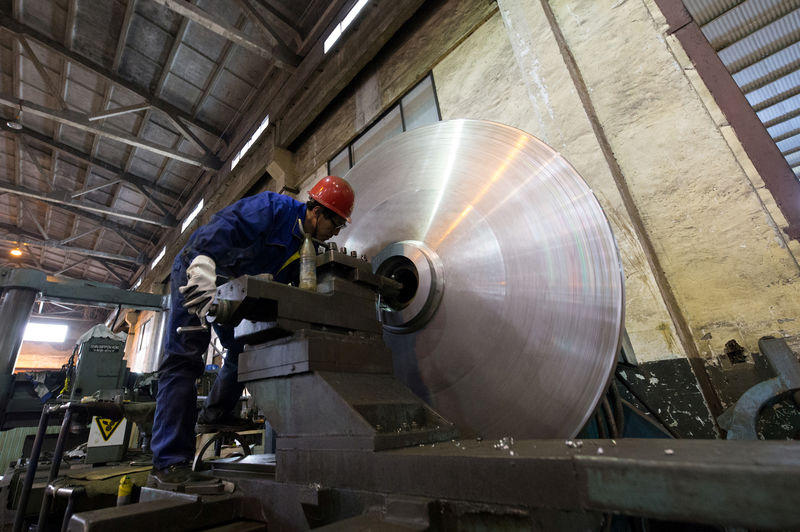BEIJING, Feb 1 (Reuters) - China's factory activity shrank by the most in almost three years in January as new orders slumped further and output fell, a private survey showed, reinforcing fears a slowdown in the world's second-largest economy is deepening.
The gloomy readings were more downbeat than an official survey on Thursday, which also showed growing strains on China's manufacturing sector, a key source of growth and jobs.
The Caixin/Markit Manufacturing Purchasing Managers' Index (PMI) for January, released on Friday, fell a second straight month, reaching 48.3 - its worst reading since February 2016 - from 49.7 in December.
Economists polled by Reuters had forecast only a marginal dip for January to 49.5, just below the neutral 50-mark dividing expansion from contraction on a monthly basis.
Taken together, the private and official factory PMIs suggest China's economy continued to lose momentum at the start of the year, which was widely expected, with small and medium-sized firms under the most stress despite a slew of government support measures for the private sector.
New orders - an indicator of future activity - also contracted for the second straight month, to 47.3, the lowest reading since September 2015, with companies reporting weak market demand despite the most aggressive price discounting in three years.
Softer demand hit factory output, which contracted for the first time in 31 months. Factories cut jobs for the 63nd month in a row.
Purchasing activity declined for the first time in 20 months, likely due to a lack of new work and lower production requirements. The last time purchasing contracted at a faster pace was in December 2015.
Chinese authorities have been fast-tracking infrastructure projects and cutting import tariffs in a bid to rekindle domestic demand, but the moves will take time to kick in and many analysts believe the economy will not stabilize until the middle of this year.
"On the whole, countercyclical economic policy hasn't had a significant effect," Zhengsheng Zhong, director of macroeconomic analysis at CEBM Group, said in a commentary accompanying the data release.
Domestic demand had already been weakening before the United States and China in 2018 started to impose tit-for-tat tariffs on each other's exports, as a regulatory crackdown on risky lending was pushing up borrowing costs.
In contrast to the gloomy indicators, the Caixin survey showed that export orders increased slightly in January, ending a nine-month streak of declines.
Zhong of CEBM said the pick-up was mainly due to positive sentiment from a temporary truce achieved during a meeting between President Donald Trump and President Xi Jinping in Argentina on Dec. 1.
On Wednesday, the United States and China opened high-level talks aimed at bridging their deep differences over China's intellectual property and technology transfer practices and easing their tariff dispute.
Even if there's a deal to end the trade war and shore up confidence, analysts say it would be no panacea for China's economic woes.
Business conditions in general are seen to get worse before they get better.
"China is likely to launch more fiscal and monetary measures and speed up their implementation. Yet the stance of stabilizing leverage and strict regulation hasn't changed, which means the weakening trend of China's economy will continue," said Zhong.
The Caixin/Markit survey focuses mostly on smaller businesses.

It suggested small and mid-sized firms were seeing a sharper deterioration in business conditions than larger companies, a trend that policymakers have repeatedly tried to address through special loan programs and steps to reduce operating costs.
Reporting by Yawen Chen and Ryan Woo; Editing by Richard Borsuk
Contact info: yawen.chen@thomsonreuters.com; +86 10 6627 1207; Reuters Messaging: yawen.chen.thomsonreuters.com@reuters.net